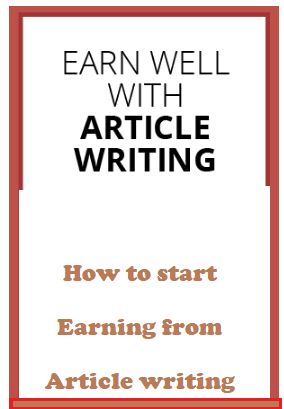
How can earn money from guest post ? Guest post is a blog or article written by someone who is not the owner or regular contributor to a website but is published on that website.
Earning money from guest posts can be a great way to monetize your website if you have decent traffic and a targeted audience. Here’s a guide:
1. Understand Your Niche and Audience
- Identify your website’s niche and target audience. Advertisers and writers will pay more if your audience aligns with their goals.
- Build credibility and traffic to make your site attractive for guest posts and must focus on valuable content.
Understanding your niche and audience is crucial for creating effective content or resources. The main topics in this area can include:
Defining Your Niche
- What is a niche?
A specific segment of the market or topic area you want to focus on, such as scholarships for international students or freelance graphic designers. - Why is choosing a niche important?
It helps you stand out, attract the right audience, and establish authority. - How to identify your niche?
Assess your passions, expertise, market demand, and gaps in existing resources.
Identifying Your Target Audience
You must identify which your target Audience. Understand their psychographics interests, values and their needs. Some points must find out for target audience.
- Who is your audience?
Understand demographics such as age, location, education level and psychographics interests, values, needs etc. - What are their problems or needs?
Pinpoint challenges your audience faces, difficulty finding reliable scholarships or learning freelance skills - How do they consume information?
Are they more likely to watch videos, read blogs, or follow social media for updates?
Market Research
- Competitor Analysis:
Analyze other websites or platforms in your niche to identify strengths, weaknesses, and opportunities. - Audience Feedback:
Use surveys, forums, or social media to gather insights directly from your potential audience. - Trends and Data:
Stay updated on market trends or changes in your niche (e.g., new scholarship opportunities or emerging freelance tools).
Positioning and Differentiation
- What makes your content unique?
Define your unique value proposition, in online platform its shortly calls (UVP). For example, offering in-depth scholarship guides with application templates or curated resources for specific freelancing niches. - Tone and Style:
Adapt your voice to resonate with your audience—formal, friendly, or expert-like.
Persona Development
- Creating Audience Personas:
Build fictional profiles representing your target audience, including their goals, challenges, and preferred platforms. - Scenarios and Use Cases:
Imagine how your audience interacts with your website or content to ensure relevance and usability.
Focusing on these topics will help you craft content and strategies tailored to the needs and expectations of your niche audience.

2. Set Up a Guest Post Policy
- Clearly outline the topics you accept, quality standards, and any promotional rules.
- Specify if you allow do-follow backlinks, sponsored links, or promotional content, as these factors affect pricing.
Setting up a guest post policy involves defining clear guidelines and expectations for contributors to ensure quality, relevance, and consistency on your website. Here’s a detailed guide on what to include in a guest post policy:
Purpose of the Policy
- Define your goals:
Explain why you accept guest posts (e.g., to share diverse perspectives, build community, or provide valuable content to your audience). - Outline the benefits for contributors:
Highlight exposure, backlinks, or credibility they can gain.
Topics and Niche Relevance
- State your niche:
Clearly mention the focus areas for guest posts (e.g., scholarships, freelancing, online learning). - List acceptable topics:
Provide examples, such as “Scholarship application tips,” “Freelancing productivity hacks,” or “Online learning strategies.” - Prohibit irrelevant topics:
Mention what won’t be accepted to avoid submissions unrelated to your audience.
Content Quality Guidelines
- Originality:
Require 100% original, unpublished content with no plagiarism. - Word count:
Specify a minimum and maximum word count ( 800–1,500 words). - Writing style:
Ensure the tone aligns with your site (professional, conversational, or educational). - Structure:
Ask for well-organized content with headings, subheadings, bullet points, and short paragraphs. - Grammar and spelling:
Insist on error-free, polished writing.
Link Policy
- Outbound links:
Limit the number of links to high-quality, relevant sources (e.g., 1–2 backlinks allowed). - 17Affiliate or promotional links:
Prohibit or review promotional links before approval. - Author bio links:
Allow a link in the author bio to their personal website or portfolio.
Submission Process
- How to submit:
Provide instructions, such as emailing submissions to a specific address or using a submission form. - Required materials:
Include details like a brief bio, headshot, and writing samples (if applicable). - Subject line format:
Specify a subject line format for email submissions (e.g., “Guest Post Submission – [Proposed Title]”).
Review and Editing Policy
- Review timeline:
Inform contributors about the review duration (e.g., 1–2 weeks). - Editing rights:
Reserve the right to edit submissions for clarity, grammar, or formatting. - Rejection policy:
Explain that not all submissions will be accepted and provide reasons when possible.
Copyright and Ownership
- Who owns the content?
Specify whether the author retains copyright or grants it to you. - Reuse policy:
Prohibit reposting the same article elsewhere if it’s published on your site.
Compensation Policy
- Paid or unpaid posts:
Clarify if you pay for guest posts or offer exposure as compensation. - Sponsored content distinction:
Define the difference between guest posts and sponsored posts (if applicable).
Examples of Accepted Posts
- Provide links or references to existing articles that match the desired quality and style.
Contact and Follow-Up
- Include an email or contact form link for inquiries.
- Provide a timeline for responses (e.g., “We aim to respond within 5 business days”).
Example Guest Post Policy Statement:
“We welcome guest posts from passionate writers in the areas of scholarships, freelancing, and online learning. Articles should be 1,000–1,500 words, original, and well-researched. We allow one backlink in the author bio and may edit submissions for clarity. Please email your submission to [email address] with the subject line ‘Guest Post Submission – [Your Topic]’. We review submissions within two weeks and reserve the right to decline any post that doesn’t meet our guidelines.”
By having a well-defined guest post policy, you can streamline submissions and maintain high-quality content on your site.
3. Build Traffic and Domain Authority
- Higher domain authority (DA) and monthly traffic can help you charge more for guest posts.
- Regularly update your content and optimize your website for SEO to make it appealing to contributors.
To build traffic and domain authority, focus on creating high-quality, engaging content in various formats like blogs, videos, and infographics, while maintaining consistency. Optimize your website for SEO by targeting relevant keywords, improving site speed, and using a strong internal link structure. Build backlinks through guest posts, collaborations, and creating linkable resources. Actively promote content on social media, engage with followers, and consider using paid ads strategically. Use email marketing to build a mailing list, send tailored newsletters, and drive repeat visits. Strengthen your online presence by collaborating with influencers, participating in communities, and hosting webinars. Ensure an excellent user experience with fast loading times, mobile responsiveness, and intuitive navigation. Regularly track performance using analytics tools, update strategies, and refine based on insights. Maintain consistent branding and professionalism, and consider paid ads or remarketing to target specific audiences effectively.
4. Promote Your Website for Guest Posts
- Create a dedicated “Write for Us” page:
- Include details about your audience, guidelines, and pricing.
- List your website on platforms like:
- Guest Post Marketplace Websites (e.g., Link-able, Collaborator, Outreach sites).
- Freelancer websites (e.g., Fiverr, Upwork) to attract clients.
5. Set a Pricing Structure
- Base your pricing on:
- Website metrics (DA, PA, traffic).
- The inclusion of backlinks or promotional content.
- Research competitors’ rates in your niche to stay competitive.
- Typically, charges range from $50 to $500+ per guest post, depending on the site’s authority.
6. Provide Value
- Assure high-quality formatting, visibility, and proper indexing of guest posts.
- Promote the posts on your social media channels or newsletters to add value for the contributor.
7. Comply with Google Policies
- Label paid or promotional posts as sponsored to avoid penalties.
- Use proper tags (e.g., rel=”nofollow” or rel=”sponsored”) for paid links to maintain compliance with Google’s guidelines.
8. Offer Additional Services
- Content Creation: Offer to write the post for an additional fee.
- Promotion: Bundle guest posts with social media promotion or email campaigns.
Example Workflow:
- Someone submits a request for a guest post.
- You review the content for quality and relevance.
- Agree on a price, and receive payment via PayPal or other platforms.
- Publish the post on your website.
If you consistently deliver value to your contributors and grow your site’s authority, you can turn guest posts into a steady income stream.
Free Amazon Affiliate Marketing Guide for 2025. Click here







